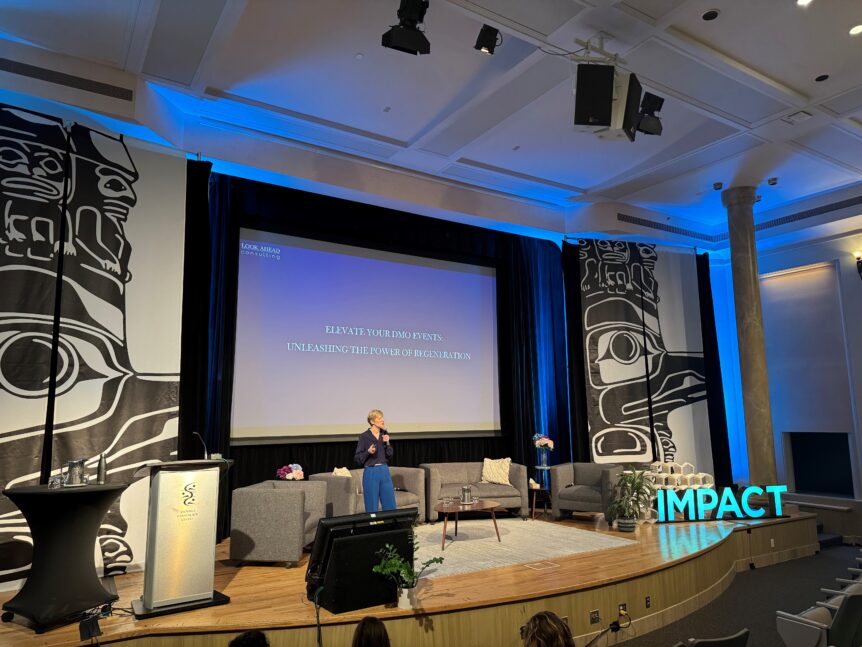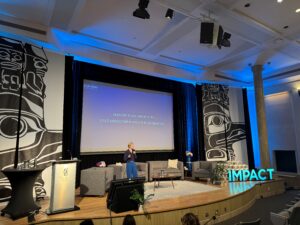
Blog #16 Event Evolution: Towards a Sustainable Future

If climate change is close to your heart and business, you’re buzzing with the knowledge we need to take action.
But with information overload, seemingly ever-changing advice, and work continuing to pile up, you panic. There’s so much to do you don’t know where to start, so you don’t start at all. It’s overwhelming.
I felt the same way.
I’ve been on a mission in my personal and professional life to become more climate-conscious. In the beginning, it seemed almost impossible. Still, over time, I figured out how I could adjust my business practices to reduce my environmental impact and even have a regenerative effect, leaving something in a better place than when I started.
My biggest realization? The best way isn’t to start from scratch.
Instead, it’s by modifying and improving on your existing system.
Over time, I created a simple framework to guide Destination Marketing Organisations to create sustainable, regenerative events. It’s the guide I wish I had back when I started.
Start with what you know
Instead of reinventing the wheel, let’s take an existing recurring event – use the example of a tourism Town Hall – and tweak it to reflect regenerative practices.
Here are some basic principles:
- design out waste and carbon emissions
- keep products in use
- inclusive and diverse representation
- regenerate natural systems
- generate societal impact
Apply these principles to elements of your events that are predictable. Create a checklist that covers all these elements, and simply work through it as you plan your event. It sounds simplistic, and it is! And as event professionals, we’re more than used to lists.
The steps:
- Get everyone on board
The first step is to train your teams and stakeholders on your basic principles so everyone knows what they’re doing and why. You don’t need to hold an offsite meeting or a death-by PowerPoint presentation for this. Instead, learn by doing with your chosen kickoff event. You’re doing the Town Hall anyway; why not have an impact from day one?
- Create a simple starting policy
I do mean simple. A one-pager is perfect, and I recommend starting with a set of clear, tangible goals. You don’t need to tackle all the basic principles at once, rather start with something actionable.
An example could be: “We are not using single-use plastics in any form in our event.”
Attach the one-pager to the RFP you send suppliers so you’ll only attract and use those who share your environmental values.
- Keep your destination’s most pressing social progress issues in mind.
It goes without saying that the experts here are the locals. Get in touch with the people on the ground, attach your work to existing initiatives and leverage your events and attendees to address these social issues.
It can be as simplistic as an optional beach cleanup morning or something more nuanced. It all depends on the need and your willingness to seek it out.
- Accept that perfection doesn’t exist.
One destination won’t tick every box when it comes to sustainability, and that’s ok.
In an ideal world, we’d recycle all recyclables and compost all food waste for every event. But not all destinations have this capability, and that’s ok. They may instead be exploring creative ways to cut down on emissions in other spaces, and it’s up to you to leverage that.
We’re aiming for progress, not perfection.
- Measure your impact
We can’t see improvement without measurement, so we need data to tackle the climate crisis!
It can be intimidating to see your numbers laid out, and many DMOs have historically shied away from gathering data because of the associated cost, but our industry must embrace technology. The initial price is well worth the knowledge and power data brings. I’d be happy to share some tools I’ve been exploring.
- Tell your story
This has a twofold impact. First, being transparent about your own shortcomings and goals attracts like-minded collaborators. Next, sharing your experiences can help inspire other DMOs, suppliers and organizations to see that change is possible.
Returning to our Town Hall example, set time on the schedule to share your learnings from the event itself, and make sure that all communication is clear that this is a regenerative, sustainability-minded event.
We also want everyone who touches our event to come on the journey.
Now rinse and repeat
Keep regenerative principles in mind with each new event and hone your checklists, requirements and measurables.
The more you iterate and improve, the more you establish your organization as a voice to value in the regenerative event space, and the more like-minded stakeholders and destinations will want to work with and learn from you.
I use these steps in all my own work and, to an extent, in my personal life, too. For me, a strategy for regeneration and climate consciousness is non-negotiable. I hope it becomes one for you.
In my next blog, I’ll share some of the tactics that make this strategy come to life. In the meantime, I’d love to chat with you if you have any questions or suggestions or if you’d like me to come and give an in-depth workshop to your team.

